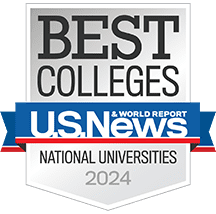Master’s Concentration
Supply Chain Management: Master’s Degree
Become a problem solver using 21st century supply chain solutions! Build your end-to-end knowledge of supply chain management and forge invaluable connections to industry. In this master’s degree concentration, you’ll explore the six pillars of supply chain management (design, procurement, planning, manufacturing, logistics, and sustainability), cultivate strategies to solve supply chain issues, and connect supply chain with business. Working one-on-one with faculty and industry leaders, you’ll gain hands-on experience identifying, planning, and executing real supply chain projects and customize content to your interests and professional experience.
Let us help you succeed.
*Indicates a required field.
Top-ranked, career-focused education in a flexible format.
At a Glance
Classes Begin
January 6
Term Length
10 Weeks
Master's Tuition
$835 per credit hour

Top-Ranked University
U.S. News & World Report Rankings
Featured Instructors
Skills You’ll Learn
Curriculum
Master of Science in Supply Chain Management requires completion of 48 credit hours (12 courses).
11
Core Courses
1
Elective Courses
Sample Schedule
Plan out your schedule and determine your preferred timeline for completing your master's degree—finish in as few as 18 months or take up to five years.
Interested in a graduate certificate?
Explore our four and six course graduate certificates in Supply Chain Management.
Take a Course Before You Apply
We know how important it is to get started when you’re ready and that’s why you can enroll in a course before you officially apply.
Career Outcomes
Predicted outcomes for graduates of Supply Chain Management
The demand for supply chain professionals exceeds supply by six to one, according to the Association for Supply Chain Management.
Harvard Business Review found U.S. supply chain employs 37% of the workforce and over 40 million people. These supply chain jobs have higher than average salaries and contribute to much of the innovative activity in the economy.
Disruptions to the supply chain during global events, such as the recent coronavirus pandemic, highlight the need for effective supply chain management and qualified practitioners in this field, according to Bloomberg.
Job Titles
Supply Chain Director Salary Salary: National Average
$152,035
(Salary.com)
Get Ahead with Career Services
One-on-one career coaching and mock interviews
Job database dedicated to DU students and alumni
Résumé and cover letter guidance
Hear from Our Students
Theme: Job Satisfaction
Supply Chain Management
Graduate program entirely online with weekly Zoom sessions.
Flexible Online Classes
We understand the demands of balancing work, friends and family, and school can be challenging. That's why at University College, you can complete your program entirely online. Our online learning platform makes it easy to work anywhere at any time.
Accreditation
Higher Learning Commission
University College programs maintain the highest level of accreditation offered by The Higher Learning Commission, one of the regional accrediting bodies recognized by the federal government. The University of Denver and all of its academic programs are regionally accredited by this commission, and regional accreditation is the highest standard for universities in the United States.
Take the Next Step












